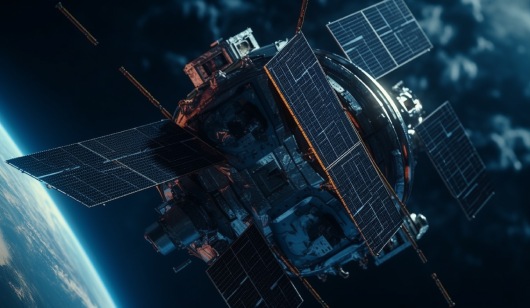-
The space industry has seen remarkable growth recently and is poised for further expansion. Countries and private firms are racing for lunar missions, orbital expansion, and comprehensive space programs. However, challenges like security and transparency persist. Blockchain technology holds promise as a solution for addressing these issues.
In this article, we will understand how blockchain application development can help businesses to offer a promising solution to many of these challenges, and its applications in the space industry.
The Space Industry's Growth Spurt
The space industry has witnessed unprecedented growth and development, driven by a confluence of factors. The race to explore celestial bodies such as the Moon and Mars, the pursuit of commercial space travel, and advancements in satellite technology have all contributed to this growth. Private companies like SpaceX, Blue Origin, and Virgin Galactic are competing to make space travel more accessible, while traditional space agencies like NASA and the European Space Agency (ESA) continue to spearhead groundbreaking missions.
This surge in activity has ushered in a new era of space exploration and innovation, but it has also brought forth a set of unique challenges that must be addressed as the industry expands further.
Suggested Read | NASA and the Aerospace Industry are Resorting to Blockchain Solutions
Challenges in the Space Industry
As the space industry continues to grow, it faces several critical challenges:
Security
Securing space assets, data, and communication channels is paramount. With an increasing number of satellites and space-based infrastructure in orbit, the risk of cyberattacks and data breaches has grown significantly.
Trust
Space missions often involve collaborations between various international entities, including governments, space agencies, and private companies. Establishing trust among these diverse stakeholders and ensuring transparency in collaborations is essential for successful missions.
Transparency
The space industry is characterized by a multitude of stakeholders, each with varying levels of involvement and financial interests. Maintaining transparency in financial transactions and data sharing is crucial for accountability and fostering trust among partners.
Also, Explore | The Emergence of Blockchain Applications in Manufacturing
Blockchain as a Solution
Blockchain technology offers a range of applications that can effectively address these challenges in the space industry:
Secure Data Transmission
Blockchain can provide a secure and tamper-proof method for transmitting data between space assets and ground stations. It ensures that data remains intact and unaltered during transmission, reducing the risk of data tampering or interception.
Smart Contracts
Smart contracts, self-executing contracts with predefined rules and conditions, can automate and enforce agreements between parties involved in space missions. These contracts reduce the need for intermediaries and enhance trust among collaborators.
Also, Explore | Blockchain in Project Management | Exploring its Potentials
Supply Chain Management
Blockchain can be used to track the components and materials used in space missions, ensuring the authenticity and quality of critical components. It is particularly important in cases where components are sourced from multiple suppliers and manufacturers.
Tokenization of Space Assets
Tokenizing space assets, such as satellite bandwidth or telescope time, can enable fractional ownership and democratize access to space resources. It allows for the efficient utilization of space assets and facilitates investment opportunities for a broader range of participants.
Immutable Records
The immutability of blockchain records ensures transparency in financial transactions, which is crucial for international collaborations and partnerships in the space industry. Stakeholders can easily audit and verify financial records, reducing the potential for disputes or mistrust.
Check It Out | Notable Blockchain Applications and Use Cases in the Sports Industry
Real-World Examples
Several initiatives and organizations are already exploring the integration of blockchain technology into the space industry:
SpaceChain
SpaceChain is a pioneering blockchain-based satellite network that aims to provide a secure and decentralized infrastructure for space-based applications. It focuses on enhancing the security and resilience of satellite communications.
NASA and Blockchain
NASA, the United States space agency, has shown interest in using blockchain for tracking spacecraft components and ensuring the integrity of data transmitted from satellites. Blockchain can enhance data security and reduce the risk of data manipulation during transmission.
Private Space Companies
Numerous private space companies are actively exploring blockchain solutions to secure satellite communications and ensure the authenticity of space resources. It includes the use of blockchain to track satellite launches, verify satellite positions, and manage space traffic.
Also, Discover | Ethereum Blockchain Applications and Use Cases in Healthcare
Conclusion
In conclusion, as the space industry continues its rapid expansion, the integration of blockchain technology holds the potential to enhance security, trust, and transparency in space missions and operations. Blockchain's applications in securing data transmission, automating contracts, managing supply chains, and tokenizing space assets can address the industry's pressing challenges. While there are obstacles to overcome, the synergy between blockchain and space exploration promises exciting possibilities and advancements in the final frontier.
As the space industry continues to evolve, blockchain may become an integral part of the technology stack that underpins humanity's journey into the cosmos.
Ready to propel your space industry ventures with blockchain? Connect with our blockchain developers today to explore innovative solutions and secure your place in the cosmos!

Our Offices
INDIA
Emaar Digital Greens, Sector 61,
Gurugram, Haryana
122011.
Welldone Tech Park,
Sector 48, Sohna road,
Gurugram, Haryana
122018.















